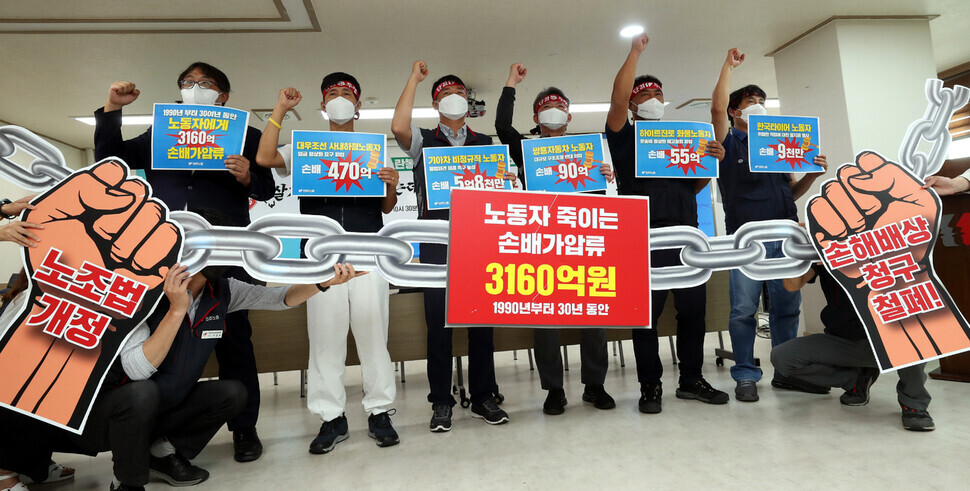hankyoreh
Links to other country sites 다른 나라 사이트 링크
[Column] South Korea: A country where striking becomes illegal all too easily


“Since 2009, every day has seemed like a punishment,” SsangYong Motor worker Kim Jeong-wook said in a recent press conference.
“I’m living in an invisible prison,” he lamented. He was drawing an analogy between a prison sentence and his experience of being burdened by lawsuits demanding compensation in the billions of won.
Kim and 66 other SsangYong workers were sued for damages by the company and police 13 years ago. The reason was what was deemed to be an “illegal” strike opposing the automaker’s layoffs.
In Korea, strikes are all too easily treated as “illegal.” If you do an online search for “strike,” the word “illegal” always seems to appear next to it.
Isn’t there something strange about that? Why should every strike be labeled “illegal” in a country like Korea where the three major labor rights are guaranteed by the Constitution?
As is well known, Article 33 of the South Korean Constitution states, “To enhance working conditions, workers shall have the right to independent association, collective bargaining and collective action.” There are no provisions suspending the law’s terms, as in the case of Article 23 on property rights, which allows for limits to be determined by law.
In practice, however, this obvious right is routinely reduced to nominal status. The reason has to do with the Trade Union and Labor Relations Adjustment Act (Trade Union Act), which regulates actual workplaces.
The Trade Union Act is meant to guarantee the three labor rights stipulated in the Constitution. That’s what is written in Article 1, which lays out its purpose.
But ultimately, the part about “guaranteeing” those rights is just dressing, since the law is packed with provisions that demonize strikes. To get a strike recognized as “legal,” you have to pass through a veritable minefield of punishments and prohibitions.
To be sure, the Trade Union Act has some provisions that provide exemptions. Article 3, for example, states, “No employer shall claim damages against a trade union or workers in cases where he/she has suffered damage because of collective bargaining or industrial action under this Act.”
In a sense, this waiving of responsibility for damages from strikes is a no-brainer: The Constitution guarantees the basic right to collective action, which centers on industrial actions, and Article 2 of the Trade Union Act defines “industrial action” as “actions or counter-actions which obstruct the normal operation of a business.”
The magic wand that makes this exemption go away is the wording “under this Act.”
Courts have interpreted this as meaning “in compliance with this Act.” The problem with this is that holding a strike in compliance with the act borders on impossible due to the multitude of constraints that workers face on collective action.
The Trade Union Act includes close to 100 articles, most of which restrict or deny labor rights. Around 40 of the provisions stipulate punishments and penalties, according to a sourcebook from a National Assembly discussion on the struggle of subcontracting worker unions at Daewoo Shipbuilding & Marine Engineering (DSME) and provisional attachments to compensate for damages.
Since the Trade Union Act renders basically every kind of strike “illegal,” employers use lawsuits claiming damages as a kind of trump card. The basis for their legal action is the Civil Act provision on torts, which states, “Any person who causes losses to or inflicts injuries on another person by an unlawful act, intentionally or negligently, shall be bound to make compensation for damages arising therefrom.”
A strike is an act of collectively refusing to provide labor, which means that it inevitably entails losses to the company. Somewhere along the way, it has become regarded as a basic right of employers to demand that workers pay for the losses resulting from their strike.
The finishing touch on this uneven playing field has been the decisions of the courts themselves.
With lawsuits demanding compensation for damages, the key question comes down to the legitimacy of the strike. But the courts deem strikes to be illegal and recognize the workers’ responsibility for compensation if any aspect of the industrial actions — the participants, the aims, the procedures or the means — is found to be illegitimate.
For instance, strikes against layoffs, which have a serious negative impact on worker status, are ruled “illegal” because the aims are not considered to be just. Courts also restrict the parties in industrial actions to the parties in collective bargaining, namely labor and management existing in a labor contract relationship.
This means that even though employers are often responsible for dictating the working conditions for their subcontractors’ employees, a strike by those workers against the company employing those subcontractors is not considered legitimate.
In a society where strikes are basically treated as illegal, those who embark on one have to be prepared to go to prison. If a court finds their strike illegitimate, they are punishable for obstruction of duties under the Criminal Act.
Of the so-called “advanced countries,” South Korea is the only one that criminally punishes workers for strikes. It’s also apparently rare to find other countries that include provisions for criminal punishment in their laws regulating labor-management relations.
It’s been a good 20 years or so since these indiscriminate lawsuits demanding damages have emerged as a societal problem, undermining constitutionally guaranteed labor rights and destroying the lives of workers.
If there is a silver lining, it’s that the recent lawsuit demanding 47 billion won (US$34 million) in compensation from DSME subcontractor employees has sparked a more active push than ever before to create a society where strikes are legally recognized in practice.
This is the campaign to amend the Trade Union Act, also known as the “yellow envelope act.” At its core, it’s about broadening the scope of what is considered “legitimate industrial action” for which workers are exempted from having to pay damages.
The Democratic Party has included the “yellow envelope act” on its list of 22 livelihood legislation areas to be addressed during the National Assembly’s regular session. If Korea wants to shed its bad name for backwardness when it comes to labor rights, it cannot afford to ignore this issue any longer.
Please direct questions or comments to [english@hani.co.kr]

Editorial・opinion
![[Editorial] Yoon must halt procurement of SM-3 interceptor missiles [Editorial] Yoon must halt procurement of SM-3 interceptor missiles](https://flexible.img.hani.co.kr/flexible/normal/500/300/imgdb/child/2024/0501/17145495551605_1717145495195344.jpg) [Editorial] Yoon must halt procurement of SM-3 interceptor missiles
[Editorial] Yoon must halt procurement of SM-3 interceptor missiles![[Guest essay] Maybe Korea’s rapid population decline is an opportunity, not a crisis [Guest essay] Maybe Korea’s rapid population decline is an opportunity, not a crisis](https://flexible.img.hani.co.kr/flexible/normal/500/300/imgdb/original/2024/0430/9417144634983596.jpg) [Guest essay] Maybe Korea’s rapid population decline is an opportunity, not a crisis
[Guest essay] Maybe Korea’s rapid population decline is an opportunity, not a crisis- [Column] Can Yoon steer diplomacy with Russia, China back on track?
- [Column] Season 2 of special prosecutor probe may be coming to Korea soon
- [Column] Park Geun-hye déjà vu in Yoon Suk-yeol
- [Editorial] New weight of N. Korea’s nuclear threats makes dialogue all the more urgent
- [Guest essay] The real reason Korea’s new right wants to dub Rhee a founding father
- [Column] ‘Choson’: Is it time we start referring to N. Korea in its own terms?
- [Editorial] Japan’s rewriting of history with Korea has gone too far
- [Column] The president’s questionable capacity for dialogue
Most viewed articles
- 1Months and months of overdue wages are pushing migrant workers in Korea into debt
- 2At heart of West’s handwringing over Chinese ‘overcapacity,’ a battle to lead key future industries
- 3Seoul getting its first-ever vertical farm
- 4[Column] For K-pop idols, is all love forbidden love?
- 5Trump asks why US would defend Korea, hints at hiking Seoul’s defense cost burden
- 6[Editorial] When the choice is kids or career, Korea will never overcome birth rate woes
- 7[Editorial] Yoon must halt procurement of SM-3 interceptor missiles
- 8[Guest essay] Maybe Korea’s rapid population decline is an opportunity, not a crisis
- 9Under conservative chief, Korea’s TRC brands teenage wartime massacre victims as traitors
- 10[Editorial] 10 years on, lessons of Sewol tragedy must never be forgotten